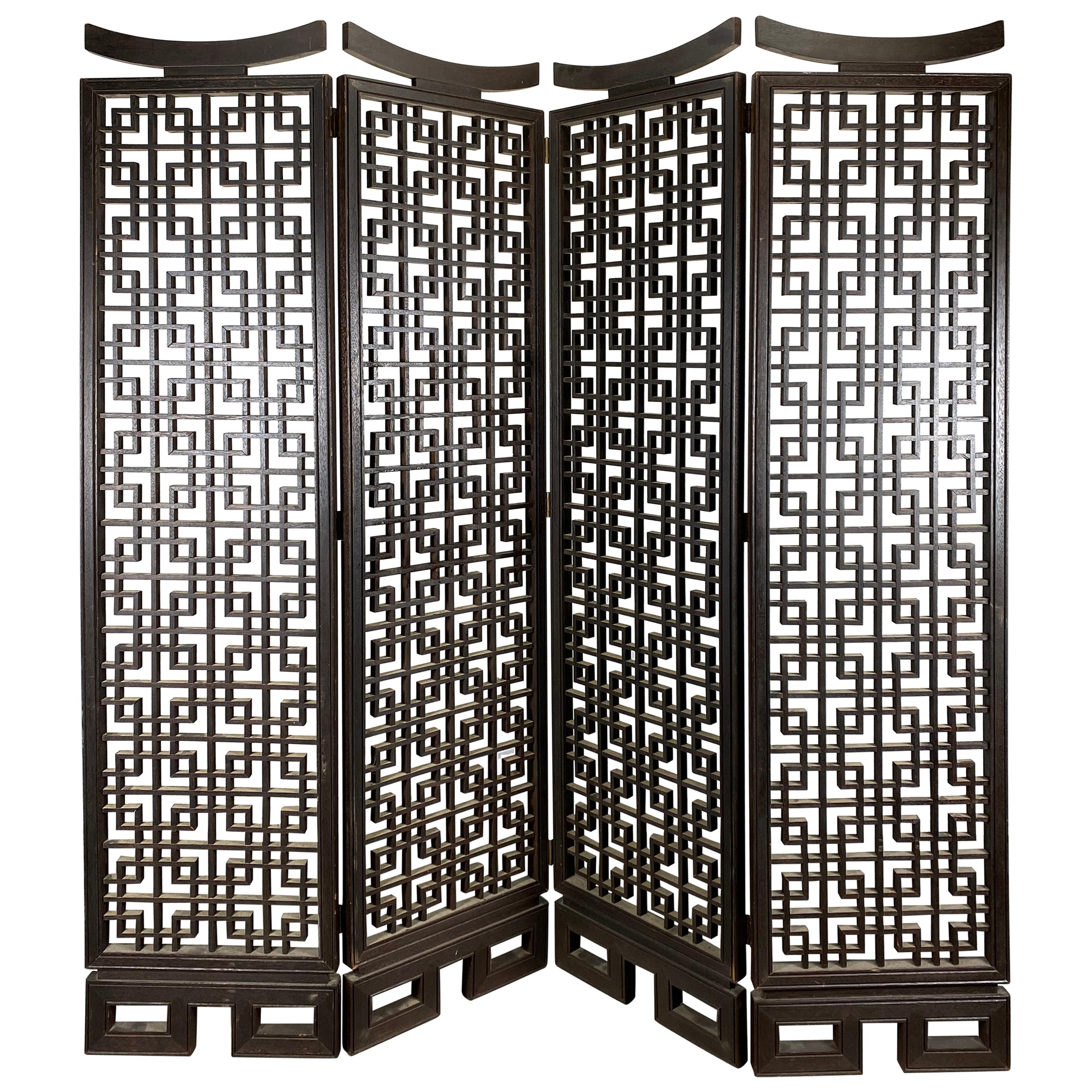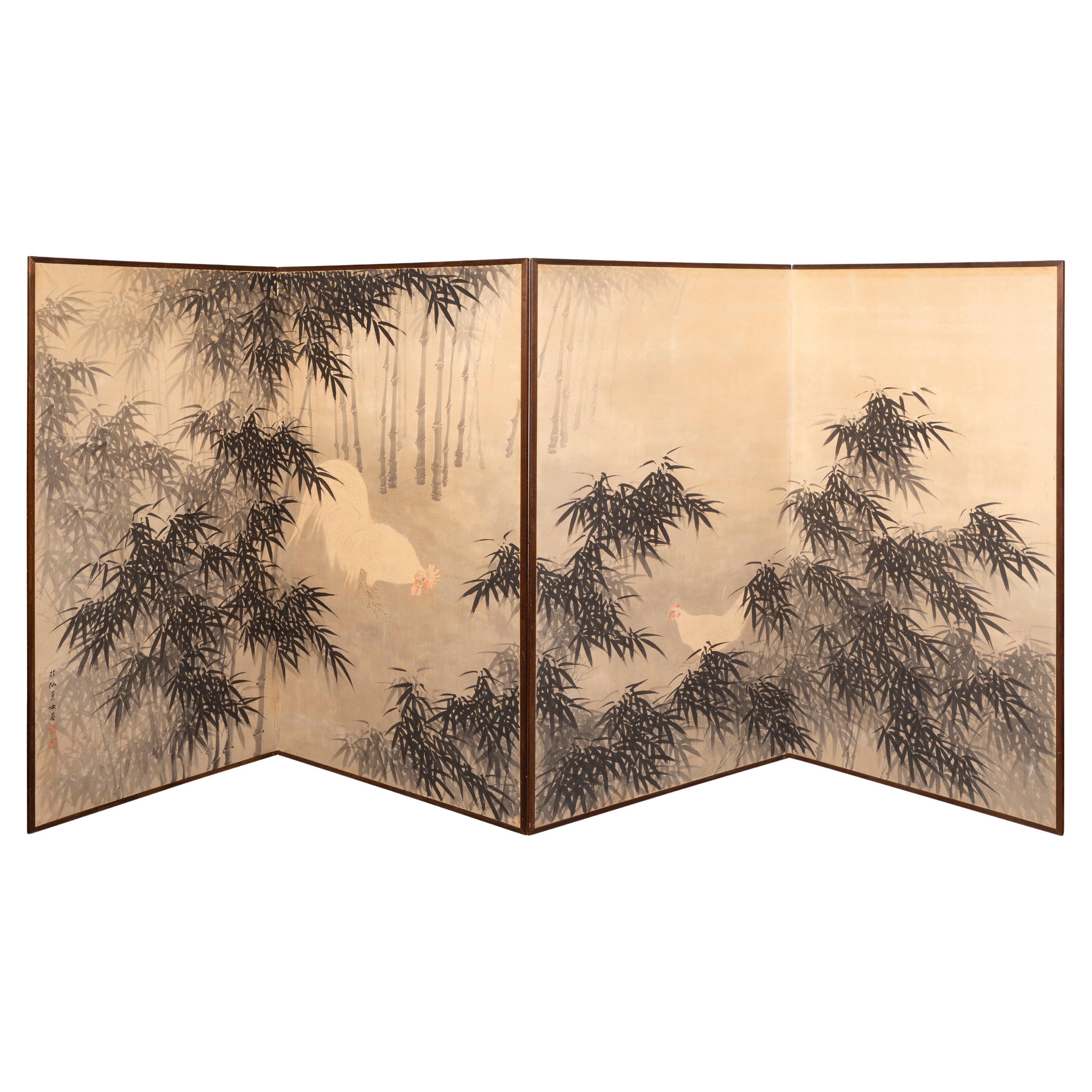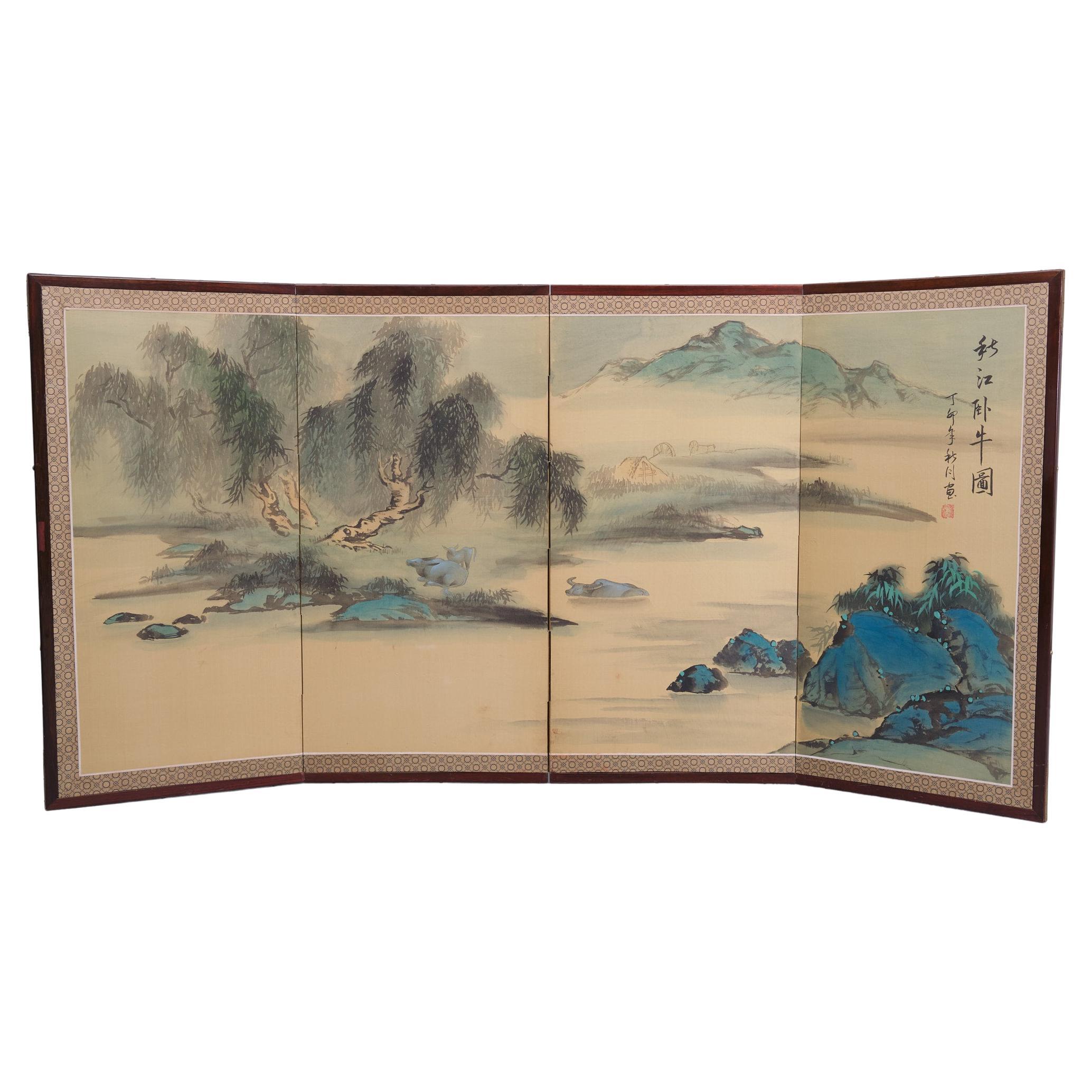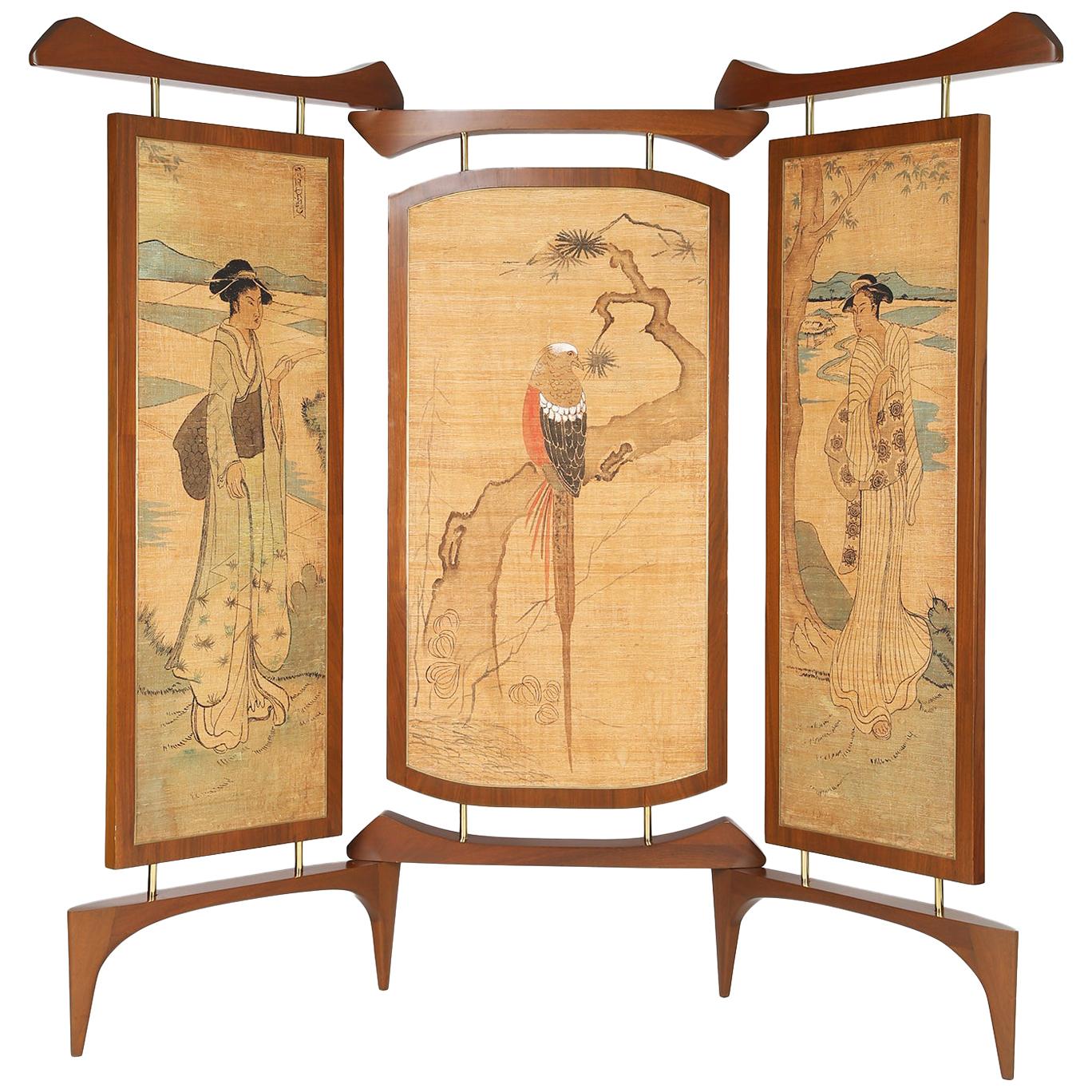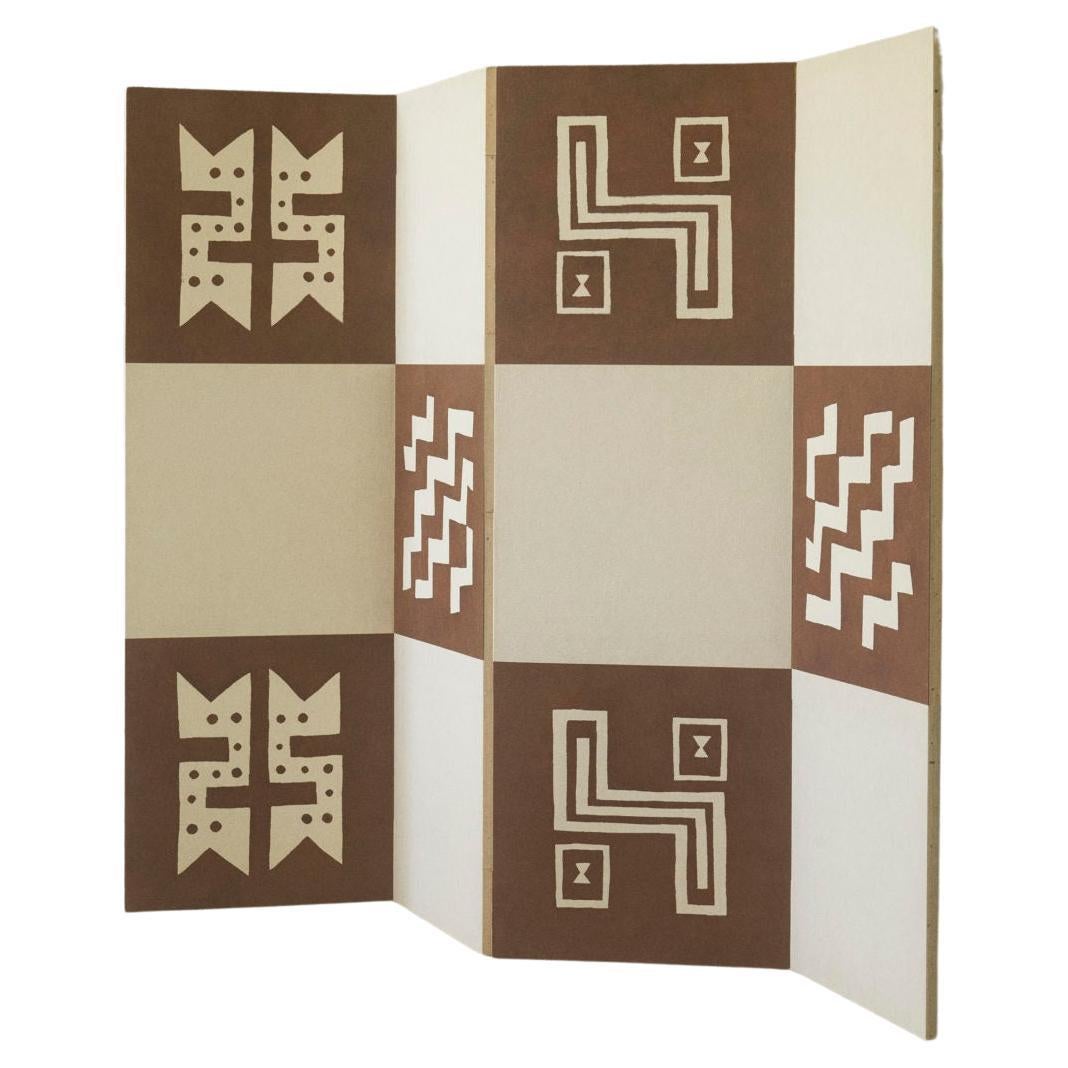Items Similar to Japanese Floor Screen Shoji Paper Natural Elements Elmwood Frame, 1950-1960
Want more images or videos?
Request additional images or videos from the seller
1 of 17
Japanese Floor Screen Shoji Paper Natural Elements Elmwood Frame, 1950-1960
About the Item
Unusual folding floor Shoji screen beautifully crafted with an elmwood frame in Japan in the 1950s-1960s.
The inset panels are vintage Washi Shoji paper with maple leafs, butterflies and sea grass captured between two sheets of rice paper for each panel.
This Washi Shoji paper went out of production in the 1960s according to a major Japanese Shoji paper dealer who opened his business in the early 1970s.
I have overlayed the original paper panels with translucent panels of white Shoji paper to protect those panels from accidental abrasions and to reduce their UV exposure.
The frames are assembled with brass screws which makes for easy disassembly and faultless removal of the white panels if you desire.
The screen is in good condition consistent with its age.
- Dimensions:Height: 66 in (167.64 cm)Width: 29 in (73.66 cm)Depth: 1.125 in (2.86 cm)
- Style:Mid-Century Modern (Of the Period)
- Materials and Techniques:
- Place of Origin:
- Period:
- Date of Manufacture:circa 1960
- Condition:Additions or alterations made to the original: added shoji paper sheets to protect original paper sheet. Wear consistent with age and use. Minor losses. minor losses.
- Seller Location:Camden, ME
- Reference Number:
About the Seller
5.0
Gold Seller
These expertly vetted sellers are highly rated and consistently exceed customer expectations.
Established in 1984
1stDibs seller since 2010
213 sales on 1stDibs
Typical response time: <1 hour
- ShippingRetrieving quote...Ships From: Camden, ME
- Return PolicyA return for this item may be initiated within 14 days of delivery.
More From This SellerView All
- Folding Floor Screen Aluminum Leaf France or Italy, 1980sLocated in Camden, MEA 4-panel aluminum-leafed folding floor screen from the 1980s possibly Italian or French. Each panel is its own individual design constructed o...Category
Vintage 1980s French Mid-Century Modern Screens and Room Dividers
MaterialsAluminum
- Salvador Corona Folding 4 Panel Floor Screen of Patzcuaro, Acapulco circa 1938By Salvador CoronaLocated in Camden, MESalvador Corona painted four-panel wooden floor screen created in his studio in Mexico circa 1938. This rare hand crafted multi medium room divider was the property of the daughter of one of Mexico's wealthiest families of the period, who married the head of an international railroad supply company in their Warren McArthur furnished apartment on Park Avenue. The custom designed Warren McArthur furniture was a gift of the Pullman Company. In the early 1950s she opened a shop in Boothbay, Maine and later on upper Lexington Avenue specializing in the crafts of Mexico. This may have been a wedding present to her from the artist, her family or a close friend. The screen shows a the harbor of 19th Century Acapulco with the major buildings with gold leaf tiled roofs, Spanish galleons in the bay, a whale spouting in the distance, birds, and silver leafed palm trees . The harbor scene is bordered in gilt painted cord. Within which are appliquéd cutout medallions of various local fish and air bubbles covered in tinfoil ,a new material in the 30s. The tinfoil is finely etched in a variety of intricate patterns. Some of the appliqués are glazed in gold. The reverse side of the screen is an ivory white back ground with vignettes from the Maximilian era of Mexico. The screen is in good condition with wear consistent with its age. Salvador Corona was born on his family's ranch Hacienda Mideras in the Mexican state of Chihuahua. Corona’s family moved to Mexico City in 1903 when he was 8. He attended the New English College in Mexico and then crossed into a career in bull fighting entering the ring for the first time in 1913. In 1919 in Guadalajara he was gored and turned to painting. He was given his first painting lessons by fellow bullfighter Jose Jimenez. Corona’s painting career spanned many decades and diverse formats including murals, furniture and decorative household items. In 1939, the Mexican government invited him to exhibit a set of painted furniture at it's booth at the World’s Fair in New York City. There, it was presented to President Franklin D. Roosevelt as a gift. Corona’s work attracted many famous patrons, including the Duchess of Windsor, Gary Cooper and writer Clare Booth Luce. Salvador Corona’s work featured many Spanish Colonial vignettes, and he became an authority on Spanish and French costumes of the 1800s, which are frequently depicted in his paintings. His favorite subjects often included Mexican Colonial criollos and Purepecha (Tarascan) Indians. Birds and other animals feature prominently in his work. His traditional self-developed folk art style images depicted pastoral colorful scenes of Maximilian era Mexico painted on white backgrounds. His work can be divided into three categories: a vice-regal era with European and Creole noblemen mixed with Indians; stylized landscapes of Patscuaro, Acapulco or the Canal of Santa Anita; and his iconographic Mexican Virgins...Category
Vintage 1930s Mexican Rancho Monterey Screens and Room Dividers
MaterialsFoil, Gold Leaf
- Exquisite Custom Studio Trompe L'oeil Four-Panel Folding ScreenBy Dorothy DraperLocated in Camden, MEImpressive midcentury 84" tall four-panel folding floor screen. Brass sabots on the base supports, brass hinges, gloss black lacquer reverse with gilt stenciled Buddhist symbols. The...Category
Vintage 1960s American Mid-Century Modern Screens and Room Dividers
MaterialsBrass
- Mahogany Fireplace Screen 19th Century Antique American Sheraton circa 1830By Thomas SheratonLocated in Camden, MEUnusual American mahogany extendable fireplace screen in the style of Thomas Sheraton. The classically styled mahogany frame with ebonized ...Category
Antique Mid-19th Century English Sheraton Screens and Room Dividers
MaterialsMahogany
- Hand-Carved Studio Mesquite Stele in the Style of J. B. Blunk, circa 1970By J. B. BlunkLocated in Camden, MEAn interesting twisted column carved from a single piece of Mesquite in the reductive style of J. B. Blunk. From an estate located in the California mid coast possibly from an artis...Category
Vintage 1970s American American Craftsman Sculptures
MaterialsWood
- Maruni Style Lounge Chairs, Japan, 1960sBy MaruniLocated in Camden, MERare pair of early 1960s hand-carved oak and vinyl cased cord laced lounge chairs in the style of the Maruni studio of Hiroshima, Japan. The turned oak fram...Category
Mid-20th Century Japanese Mid-Century Modern Lounge Chairs
MaterialsCord, Oak
You May Also Like
- Unusual 4-Panel Traditional Meji Japanese Shoji Screen / Room DividerLocated in Buffalo, NYUnusual 4-panel traditional Meji, Japanese Shoji screen / room divider, beautifully crafted, stunning design! Architectural, four hinged panels,...Category
Vintage 1960s Japanese Anglo-Japanese Screens and Room Dividers
MaterialsWood
- Japanese Four Panel Paper ScreenLocated in Essex, MAPair of two panel screens with a rooster and a hen in amongst bamboo. Signed by the artist Ema Saiko 1787-1861. A Japanese painter, poet and calligrapher celebrated for her Chinese...Category
Antique 1850s Japanese Screens and Room Dividers
MaterialsPaper
- 4 part folding screen hand painted Japan 1960sBy Zhang DaqianLocated in Den Haag, NLvery nice 4 piece folding table screen .Japan Watercolor ,landscape with some buffalo s en houses . signed .Nice bright colors .Category
Vintage 1960s Japanese Chinoiserie Screens and Room Dividers
MaterialsPaper
- Frank Kyle Extraordinary 3-Panel Screen with Japanese Motif, 1950sBy Frank KyleLocated in New York, NYExtraordinary three-panel screen in walnut and bronze by Frank Kyle, Mexico, 1950s. One side of the screen features a pastoral scene with Japanese figures...Category
Vintage 1950s Mexican Mid-Century Modern Screens and Room Dividers
MaterialsBronze
- Contemporary Keisuke Yoshida Handmade Paper Screen by Keijusha, Japan, 2004Located in Copenhagen K, DKKeisuke Yoshida Japan, 2004 Japanese handmade paper screen by Keijusha. From Toyama region. H 124 x W 180 cmCategory
Early 2000s Japanese Screens and Room Dividers
MaterialsPaper
- Japanese Two-Panel ScreenLocated in New York, NYEdo Pariod Japanese two-panel screen depicting cranes on a willow branch. 3992Category
Antique 19th Century Japanese Decorative Art
Recently Viewed
View AllMore Ways To Browse
White Room Screen
Japanese Room Screen
Paper Folding Screen
White Panel Screen
Vintage Elmwood Furniture
Two Fold Screen
More Japanese Panels
Maple Leafs Vintage
Vintage Maple Leafs
Two Panel Folding Screen
Sea Grass Furniture
Japanese Shoji
Early 20th Century Folding Screen
Panel Floor Screens
Room Dividers Japan
1970s Folding Screen
Japanese Elm
Japanese Rice Paper
